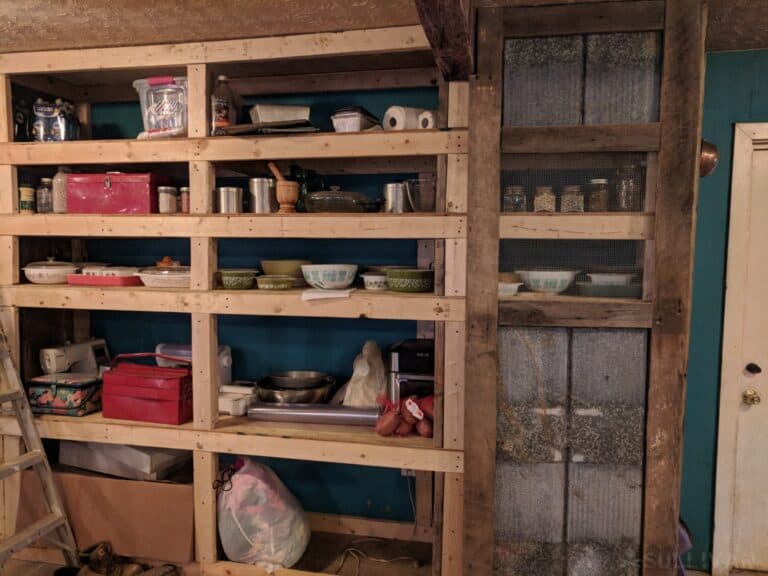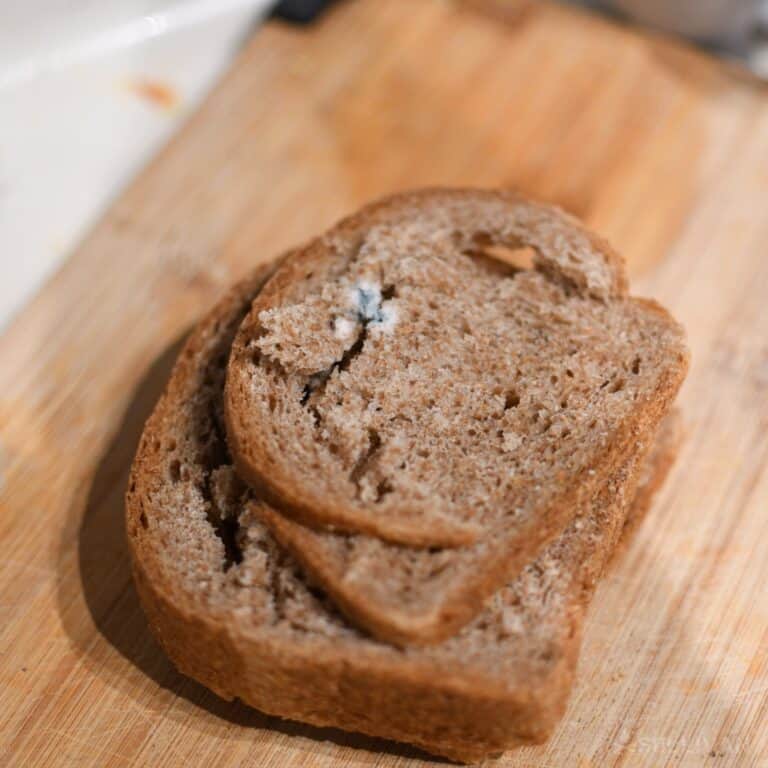Prepping isn’t all about dealing with big, regional, or global catastrophes. Sometimes the most serious problem we will have to deal with is entirely local, even right inside our own home. But that doesn’t make it any less pressing.

DIY pantry shelves with various items stockpiled
If you are a prepper, odds are that means you have a substantial stash of food inside your pantry and that means it is even more concerning than normal when you smell a funky or nasty odor emanating from inside.
Does it mean your food has gone bad? Is the odor going to affect your food? Better find it and remove bad odors. So why does your pantry smell so bad sometimes?
Pantries can start smelling bad due to a number of common causes, including spoiled, degraded, or rotted food, the effects of insect infestation, droppings and urine from rodents, an undiscovered rodent carcass, or an outbreak of mold or mildew. Any of these can cause unsettling or disgusting odors, and potentially taint other foods in your pantry. No matter what is causing the odor, you need to locate it and alleviate it as fast as you can.
It is definitely a nasty problem to deal with, but not an uncommon one. Keep reading to learn more about these peculiar pantry odor problems and how to deal with them.
Spoiled or Rotting Food
This is the most obvious and common cause of gross odors in your pantry, and the one you should sort through first on your troubleshooting checklist.
You don’t need me to tell you that all sorts of foods can lead to unpleasant or downright disgusting odors if they are allowed to spoil, go rancid or otherwise turn bad.
This is most apparent and most likely for foods that are not kept in any sort of airtight container that will prevent malodorous gases from escaping.
Perennial culprits include fresh fruits and veggies, with root veggies like potatoes, turnips, and yams being highly likely suspects, but also other dry goods like beans, rice, grains, and more.
Make it a point to carefully look through your fresh produce seeking out obvious signs of decay like sticky or glossy residue, discoloration, and oily patches left behind on shelves or in baskets.
Keep in mind, sealed food might not be out of the question, particularly if you packaged it yourself.
Anytime you gently crack open a container and get a gust of foul-smelling air coming out of it, you know you have found the likely cause.
Also keep a close eye on jarred and even canned foods, as decay will lead to gas buildup that could potentially crack a seal or otherwise rupture these nominally airtight containers, leading to a slow leak of nasty odor.
Insect Infestation
Insect infestation is another cause of bad odors, typically ones that are musty, slightly rank, or even tangy.
Mites, weevils, and other dry goods pests that are given considerable time to do their dirty work will turn entire batches of goods into a foul-smelling slurry and all sorts of insect larvae that are left to their own devices can create these odors thanks to their waste products.
Insect infestations may not be easy to locate but they are generally easy to clean up, with your first order of business being to throw out the affected food entirely.
Once that is done, if any residue remains in a container clean it thoroughly before putting it back into service.
Always go over nooks, crannies, cracks, and crevices in your pantry with exacting care to ensure no egg cases or itty bitty juvenile bugs are left behind just waiting to reinfest your new purchases.
Rodent Droppings/Urine
Another major cause of pantry reek, especially when your pantry is poorly maintained or inspected.
Rodents of all kinds, particularly mice and rats, are messy, nasty little critters, capable of easily spreading disease when left unchecked.
These tiny mammals poop and pee whenever they want and walk through it as they go to and fro and break into your food.
This combined with their natural body oils is partly responsible for that greasy track you see building up on floors, baseboard trim, and walls that they habitually pass on their roamings.
As you might imagine, it does not take long for their waste products to build up to a point where it is easily detectable, particularly their urine.
A sharp, tangy, and decidedly unpleasant odor might be your first giveaway, but you can easily spot mouse runs and their droppings by sight.
Once you have confirmation of rodent activity, you must be diligent in locating them and either trapping them for removal or killing them in a fashion where their body can be subsequently removed.
Once the rodents are gone every, single surface in the pantry and every container must be inspected for damage or breach and then thoroughly cleaned. Rodent waste is a major health hazard and vector of disease.

Mold and Mildew
Homes in damp areas or with poor moisture control are highly vulnerable to mold and mildew outbreaks, especially in warmer seasons or climates.
The enclosed nature and plentiful presence of biomatter makes pantries extra vulnerable to such.
Make sure you inspect your pantry periodically if you notice that dusty basement-, attic- or crawlspace-like odor coming from or near your pantry.
If the odor is indistinct or as recognizable but seems particularly weak, it could actually be forming behind the Walls of the pantry, necessitating you access it for proper remediation.
Minor outbreaks of mold and mildew can be treated easily enough on your own, but major outbreaks could represent a substantial health hazard and should be tackled by professionals.
If anyone in your household seems perpetually stricken with allergies or other ailments it might be because they are reacting to the presence of mold or mildew spores in adverse fashion, and it could be coming from your pantry, a location that is central to any operating household.
Rodent Carcass
Another entirely too common cause of pantry odor and definitely the most disgusting. Remember those little rodents we were just talking about a couple of sections up?
As it turns out they typically move through your average residential structure behind the walls after having gained access to the structural interior from some exterior opening that is just big enough for them to squeeze their skull through. That is all it takes.
After ingesting something that didn’t agree with them, perhaps poison from somewhere else, getting injured by a predator or a fall, or just dying from old age one of the little critters gives up the ghost behind your walls.
After expiry, they begin to decompose and anywhere from several hours to a couple of days afterward they begin to stink. And stink. And stink, eventually culminating in a foul, funereal odor that you will recognize instantly forever after once you have the misfortune of encountering it just one time.
From here, you have but two choices. Endure for a couple of weeks until decomposition is total and the odor abates or start zeroing in on the likely location of the carcass and then cut open a porthole in the wall to access and remove it.
It goes without saying this should be done wearing the proper protective equipment so you don’t contaminate yourself or anything else but the smell, assuming it alleviates, is not itself harmful.
Conclusion
Pantry odor is often unsettling, sometimes gross, but never uncommon.
Be it an infestation of insects, rodents, mold, food spoilage, or even a tiny carcass trapped behind the walls any unusual or malignant odor should be tracked down and dealt with before it becomes positively intolerable.
The post Why Does My Pantry Smell Bad? 5 Possible Reasons appeared first on Survival Sullivan.
By: Tom Marlowe
Title: Why Does My Pantry Smell Bad? 5 Possible Reasons
Sourced From: www.survivalsullivan.com/pantry-smelling-bad/
Published Date: Sat, 25 Feb 2023 00:00:00 +0000
-------------------------------------------------------------------------
Did you miss our previous article...
https://outdoorsnewswire.com/survivalist/wyoming-state-trespassing-laws
 CampingSurvivalistHuntingFishingExploringHikingPrivacy PolicyTerms And Conditions
CampingSurvivalistHuntingFishingExploringHikingPrivacy PolicyTerms And Conditions
